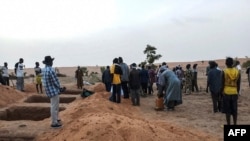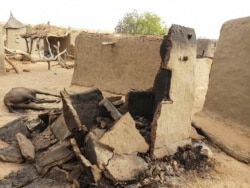An attack that killed at least 35 people in a central Malian village on June 9 has been attributed to ethnic violence, but as Islamist militants continue to hold parts of Mali and the broader region, the distinction between ethnic conflict and jihadist terror is becoming blurred.
Conflicts between ethnic Dogon, traditionally farmers, and Fulani or Peulh, semi-nomadic herders, have intensified, although the two groups have coexisted for centuries. According to a U.N. report released last month, clashes between the two ethnic groups in central Mali were "exacerbated by the presence of extremist groups."
"These conflicts have always existed, but they were not deadly in the way we see today," said Alioune Tine, director of the Afrikajom Center, a think tank in Dakar. "Today we see a transformation of the conflict — the conflict is becoming more complex and displaced — because extremists play the differences and the problems between different communities and they exacerbate them."
Since an extremist uprising in Northern Mali in 2012, large parts of the country have fallen out of control of the Malian government. In its stead, local groups have formed their own militias for self-defense.
Human Rights Watch estimates that at least 300 civilians were killed in 100 attacks in Mali during 2018.
Sunday's attack
No specific group has claimed responsibility for Sunday's attack on the Dogon village of Sobame Da. The government says the attack left 35 people dead. Initial reports put the death toll around 100; the government now says that number conflated the missing with the dead.
Locals believe the attack was carried out by Fulani militants in an act of retribution for the killing of about 160 Fulani on March 23 in the village of Ogossagou in the same region. Dogon hunters were accused in that attack.
An extra layer of confusion is often created in the culpability of attacks because of the ethnic backgrounds of certain extremist group leaders, according to Tine.
For example, Tine notes that Amadou Koufa, the leader of one of the most powerful al-Qaida affiliates in Mali, is ethnically Fulani.
"So when that group attacks, people will often say it's the Fulani who attacked," Tine explained.
Mali's president, Ibrahim Boubacar Keita, visited Sobame Da in the Mopti region to express his condolences. But he also echoed calls from the U.N. urging victims to avoid a "retaliatory spirit," and said that Mali would work to disarm local militias.
Security of Mali
But despite the U.N.'s stabilization mission in Mali (MINUSMA) and French Barkhane forces, the sheer size of Mali leaves many parts of the country, particularly in the center, without a reliable defense system or a way to be warned of potential upcoming attacks.
"Today, security forces of Mali and of the United Nations must replace militias to assure the security and wellbeing of the people," Tine said.
In his most recent report on Mali, U.N. Secretary-General Antonio Guterres said the country must disarm ethnic militias, or "there is a high risk of further escalation that could lead to the commission of atrocity crimes."
The presence of extremist forces and escalation of local conflicts is not limited to Mali — similar attacks have unfolded in neighboring Burkina Faso and Niger with increasing frequency.
Burkina Faso has seen more than 230 attacks in just over three years. In April, more than 65 people died in ethnic clashes inflamed by Islamist extremists seeking to gain a stronghold in the Sahel.





